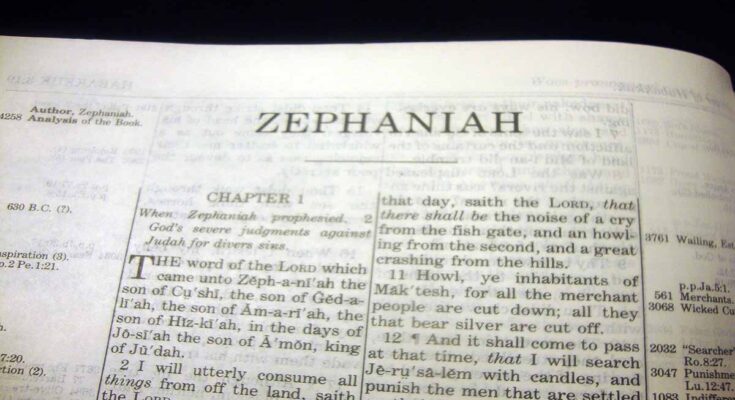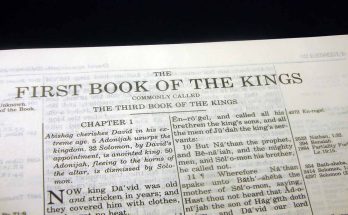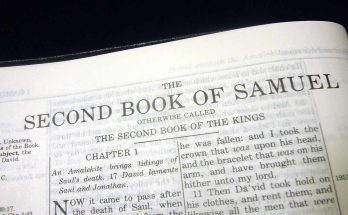The book of Zephaniah
In the book of Zephaniah the people of Judah were warned that if they refused to repent, the entire nation, including the beloved city of Jerusalem, would be lost. The people knew that God would eventually bless them, but Zephaniah made it clear that there would be judgment first, then blessing. This judgment would not be merely punishment for sin, but also a process of purifying the people. Though we live in a fallen world surrounded by evil, we can hope in the perfect kingdom of God to come and we can allow any punishment that touches us now to purify us from sin.
God is holy and must vindicate His righteousness by calling all the nations of the world into account before Him. The sovereign God will judge not only His own people but also the whole world. Wrath and mercy, severity and kindness, cannot be separated in the character of God.
The last chapter of the book of Zephaniah records the two distinct parts of the day of the Lord: Judgment and restoration. Following the conversion of the nation, Israel finally is fully restored. Under the righteous rule of God, Israel fully inherits them blessings contained in the biblical covenants.
Writer of the book of Zephaniah
Scholars are in general agreement that Zephaniah the prophet wrote this book that bears his name. In his introduction, the author traces his ancestry back four generations to Hezekiah, a former king of Judah noted for his faithfulness to God. The book of Zephaniah also tells how the prophet ministered during the days of Josiah, a godly king who reigned over the nation of Judah from about 641 to about 690 B. C.
Date Written
Most scholars place the writing of the book of Zephaniah at about 627 B. C. Probably near the end of Zephaniah’s ministry (640-621 B. C.) when King Josiah’s great reforms began.
Historical Setting of the book of Zephaniah
The book of Zephaniah belongs to a dark period in Judah’s history. About 100 years before Zephaniah’s time, Judah’s sister nation, the northern kingdom of Israel, had fallen to a foreign power because of its sin and idolatry. Zephaniah sensed that the same thing was about to happen to the southern kingdom of Judah – and for precisely the same reason.
Under the leadership of two successive evil kings, Manasseh and Amon, the people of Judah had fallen into the worship of false gods. Not even a brief religious renewal under the good king Josiah was enough to turn the tide of paganism and false worship that carried Judah toward certain destruction. The judgment came to the nation in 587 B. C., when the invading Babylonians destroyed the city of Jerusalem and carried its leading citizens into captivity in Babylon.
Theological Contribution of Zephaniah
The judgment of the Lord portrayed by the prophet Zephaniah springs from His nature as a God of holiness. Because God demands holiness and righteousness in His people, He will judge those who continue to sin and rebel. But the Lord also is merciful and faithful to His promise.
Scripture Study Resources
ESV Study Bible – Study Bibles give you a deeper understanding of God’s Word with tools for life application like commentary, maps, charts, concordance, and study notes. Search our popular translations- NIV, ESV, NKJV, KJV and more!
Believer’s Bible Commentary: Second Edition – A Bible commentary is a written, systematic series of explanations and interpretations of Scripture. Commentaries often analyze or expound on individual books of the Bible, chapter by chapter and verse by verse. Some commentary works provide analysis of the whole of Scripture.
The New Strong’s Expanded Exhaustive Concordance of the Bible – The best concordance for word study! This exclusive new edition of a legendary classic puts generations of biblical research at your fingertips. A valuable tool for pastors, teachers, and students of the Bible.
Vine’s Complete Expository Dictionary of Old and New Testament Words – This classic word study resource allows you to study the meaning of biblical words in the original languages without spending years learning Greek or Hebrew. A great resource for students, seasoned pastors, and anyone who enjoys biblical word studies–even if they have little to no formal training in Hebrew or Greek.
Halley’s Bible Handbook – The beloved and classic Bible companion has been thoroughly updated, while retaining its time-honored features and Dr. Halley’s highly personal style, to offer even greater clarity, insight, and usefulness.




